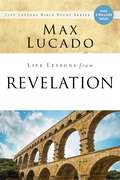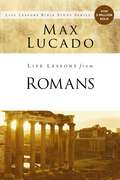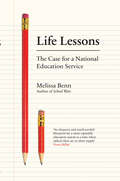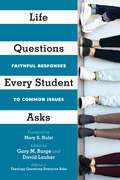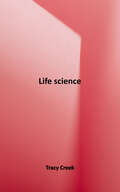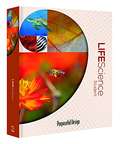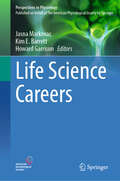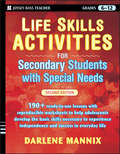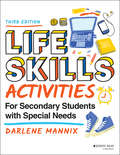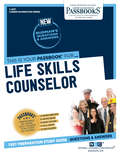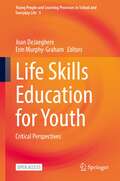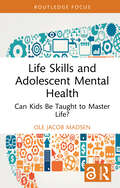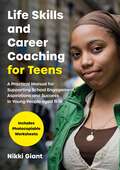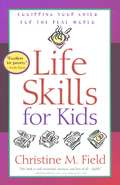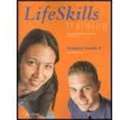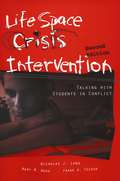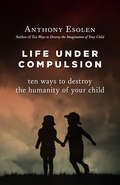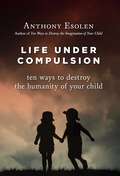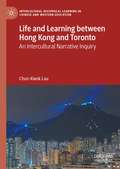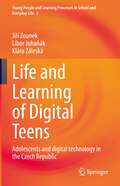- Table View
- List View
Life Lessons from Revelation: Final Curtain Call (Life Lessons)
by Max LucadoOVER 2 MILLION SOLD IN THE LIFE LESSONS SERIES!The end of the world… How do you react to that thought? Does it make you afraid or nervous? Excited? At peace? Or do you simply try not to think about it?The apostle John was privileged to preview the end of the world in a dream. While in exile on the island of Patmos, he experienced an amazing vision that gave him a glimpse of heaven. He saw the final battle between good and evil. He saw God's justice. He witnessed the assured victory for believers in Christ as all hell broke loose and all heaven came forth. He saw Jesus, born in a manger, now triumphant over Satan. John's description stretches our imagination, fuels our anticipation, and comforts us as we await the final curtain call.As you read, study, journal, and discuss the book of Revelation, watch for these key themes that Max will unpack throughout the book:God has a plan and a future for the world.God will be ultimately victorious over evil.There will be a final accounting for our faith and our lives.There is a better world in store. The Life Lessons with Max Lucado series brings the Bible to life in twelve lessons filled with intriguing questions, inspirational stories, and poignant reflections to take you deeper into God's Word. Each lesson includes:An opening reflection on the Bible book you're studying.Background information to deepen your understanding of the cultural and historical setting.An excerpt of the text (from the NIV and the NKJV).Exploration questions with plenty of room to write your own thoughts and notes.Inspirational thoughts from Max as well as a closing takeaway for further reflection. The Life Lessons series is ideal for use in both a small-group setting or for individual study.
Life Lessons from Romans: God's Big Picture (Life Lessons)
by Max LucadoOVER 2 MILLION SOLD IN THE LIFE LESSONS SERIES!Romans is a life-changing letter for those who admit they're on the wrong road. Romans provides the correct itinerary. Read it and take note. The ride home is one you won't want to miss...In this profound epistle, Paul explores all the wrong directions and takes us to the only right one. The wrong solutions are pleasure and pride, and the correct solution is Christ Jesus. Join beloved author Max Lucado as he dives into the book of Romans to consider in Paul's words everything from practical instruction for a growing church to the very core of the Christian faith.As you read, study, journal, and discuss the book of Romans, watch for these key themes that Max will unpack throughout the book:All people are in need of a relationship with God.God has prepared for that relationship through his own sacrifice.Faith is the requirement of that relationship.Forgiveness is available from God for anyone. The Life Lessons with Max Lucado series brings the Bible to life in twelve lessons filled with intriguing questions, inspirational stories, and poignant reflections to take you deeper into God's Word. Each lesson includes:An opening reflection on the Bible book you're studying.Background information to deepen your understanding of the cultural and historical setting.An excerpt of the text (from the NIV and the NKJV).Exploration questions with plenty of room to write your own thoughts and notes.Inspirational thoughts from Max as well as a closing takeaway for further reflection.The Life Lessons series is ideal for use in both a small-group setting or for individual study.
Life Lessons: The Case for a National Education Service
by Melissa BennA radical agenda to make our education system fit for the twenty-first centuryOur education system has been damaged by politicians who have arrogantly imposed a regime of market-driven reforms. It is time to reframe education as an essential public good, one arising from a hunger to find more engaging ways to learn and the powerful imperative to make our society genuinely equal.In this timely and provocative essay, Melissa Benn argues for a National Education Service. Like the NHS, the NES would provide the framework for a life-long entitlement to education: from early-years provision to apprenticeships, universities and adult education. It should be free at the point of delivery. It should nurture teachers and scholarship, moving beyond an obsession with exam results to create fully rounded, questioning citizens. Its eventual aim should be an integrated, comprehensive system available to all.
Life Of Fred Dreams
by Stanley SchmidtThe Life of Fred Language Arts Series is designed for the high school years; it is recommended that books be used in order: Australia, Begin Teaching, Classes, and Dreams. Short and to the point, each contains 19 daily lessons that are rich in the rules of the English Language. Covering grammar (not literature and writing) -as well as the many other facts about other topics Fred always integrates—these books are perfect for those who want to learn foundational English skills through the fun style of Life of Fred.
Life Of Fred: Begin Teaching
by Stanley SchmidtThe second book of the Life of Fred Language Arts Series. This series covers English for high school students. <P><P>Ellipsis, Litotes, Meter = 39 inches, Ninth way to make plurals, Since can be ambiguous, The whole point of English, Green's Theorem in Space, Consonants as defined by air flow, Location of a comma changes the meaning, 14ºC = 57ºF, What the United States, Liberia, and Myanmar have in common, Eleven ways to make plurals, 5 cm = 2 inches, Run-on sentences, Comma splices, Appositive phrase, Conjunctions, Lyrics, Iambic foot, Pentameter, Trochaic, anapestic, and dactylic feet, Scansion, Twelfth way to make plurals, Three ways to fix a comma splice, Eager vs. anxious, Not looking at the spelling of a word to decide whether to use a or an, Long vowels, Twenty-two words that don't contain a, e, i, o, or u, Idioms, Affect and effect as verbs, Affect and effect as nouns, Nouns defined, Lie vs. lay, Transitive and intransitive verbs, The Australian Environment Protection and Biodiversity Act, Pronouns defined, What some people "know," Making "happy as a clam" make sense, Scare quotes, Sixteen ways to make plurals, Cardinality of a set, Numbers-when to use words and when to use numerals, Subject-verb agreement when there is a compound subject, When to use du and when to use Sie in German, Literary symbolism, One hundred best first lines from novels, What is means to be a graduate student, Should the saying be, "The early worm gets eaten"? Dictionary vs. thesaurus, Conjugation of a verb in three tenses, Existentialism defined, The three cases in which a preposition is capitalized in a book title, The two numbers in English (singular and plural-I and we) and the three numbers in Russian, Six tenses in English, Correction: 12 tenses in English.
Life Questions Every Student Asks: Faithful Responses to Common Issues
by Gary M. Burge David Lauber David Lauber, Gary M. BurgeWhat does it mean to be in community?How can I discern my vocation?How should I understand marriage and sex?How should I relate to money and power?What happens if I doubt my faith?How should I approach interfaith dialogue?
Life Science
by Tracy CreekLife Science addresses the changes in the study of biology in the 21st century and treats them at an appropriate middle-school level. This text is an essential for any student setting upon their study of science in today’s world.
Life Science - Student Edition
by Purposeful Design Publications Development TeamThis student textbook includes: worldview connections; critical thinking skills that are developed through scientific inquiry and investigation; hands-on learning activities that excite students to want to know more; the language and processes of science; tools to help students be responsible for understanding concepts and lesson objectives. It is designed to be used with the Life Science Lab Manual.
Life Science Careers (Perspectives in Physiology)
by Jasna Markovac Kim E. Barrett Howard GarrisonThis book is written for the many Life Science PhD students who may pursue careers outside of academic research. Even though the biggest portion of students will ultimately pursue other paths, university education trains them mostly for the academic track. Students often miss information, resources, contacts, or opportunities to explore other options. In response, the editors assembled a diverse group of authors from all fields related to Life Science research. The chapters offer a peek behind the curtain of each industry and offer guidance on how to move towards such roles. Through a high level of uniformity, students will get a plethora of career stories, each providing job opportunities, job descriptions, resources, and useful contact information. The purpose of this volume is to illustrate the many excellent opportunities that are available to life science PhDs, which will still allow them to make significant contributions to science.
Life Shaping Decisions: A Career Planning Manual for Christian Young Adults
by Rick HornePlanning for a career is fraught with challenges and decisions to think through carefully. This workbook from ACSI is designed to help teenagers think through all the possibilities of their actions, including choosing a career, determining the will of God, and career stewardship.
Life Skills Activities for Secondary Students with Special Needs
by Darlene MannixReady-to-use lessons for teaching basic life skills to adolescents with special needs This book offers teachers and parents a unique collection of more than 200 worksheets to help adolescents with special needs build the life skills they need to achieve independence and succeed in everyday life. The book provides 22 complete teaching units focusing on basic life skills such as handling money, succeeding at school, using the Internet safely, getting and keeping a job, and much more. The book contains 90 reproducible worksheets for teaching students how to apply these life skills to real-life situations. A revised and updated edition of the classic book for teaching basic life skills to adolescents with special needs Includes complete teaching units with reproducible worksheets and discussion questions that teach basic life skills Offers ideas for fostering skills like using the Internet, handling money, succeeding at school, getting and keeping a job, and more Mannix is the best-selling author of Social Skills Activities for Special Children, Life Skills Activities for Special Children, and Writing Skills Activities for Special Children
Life Skills Activities for Secondary Students with Special Needs
by Darlene MannixHelp students with special needs thrive with over 160 updated educational activities In the newly revised Third Edition of Life Skills Activities for Secondary Students with Special Needs, teacher and author Darlene Mannix delivers a unique collection of over 160 updated activity sheets with related exercises, discussion questions, and evaluation suggestions to help students gain basic skills necessary for independence and success. Each activity sheet focuses on a specific skill in a real-world context and includes teacher directions for objectives, introduction, optional extension activities, and assessment methods. This crucial book includes: Activity sheets and corresponding introductions in a wide variety of critical life skills such as interpersonal, communication, academic and school, practical living, and more Coverage of leisure activities and the importance of finding fulfilling hobbies and pastimes Tools to help students build their self awareness and understand their strengths and weaknesses Perfect for special educators, general education teachers, school counselors, and psychologists, Life Skills Activities for Secondary Students with Special Needs will also earn a place in the libraries of other professionals working with special needs children, as well as the parents of those children.
Life Skills Counselor: Passbooks Study Guide (Career Examination Series)
by National Learning CorporationThe Life Skills Counselor Passbook® prepares you for your test by allowing you to take practice exams in the subjects you need to study. It provides hundreds of questions and answers in the areas that will likely be covered on your upcoming exam.
Life Skills Education for Youth: Critical Perspectives (Young People and Learning Processes in School and Everyday Life #5)
by Joan DeJaeghere Erin Murphy-GrahamThis open access volume critically reviews a diverse body of scholarship and practice that informs the conceptualization, curriculum, teaching and measurement of life skills in education settings around the world. It discusses life skills as they are implemented in schools and non-formal education, providing both qualitative and quantitative evidence of when, with whom, and how life skills do or do not impact young women’s and men’s lives in various contexts. Specifically, it examines the nature and importance of life skills, and how they are taught. It looks at the synergies and differences between life skills educational programmes and the way in which they promote social and emotional learning, vocational/employment education, and health and sexuality education. Finally, it explores how life skills may be better incorporated into education and how such education can address structures and relations of power to help youth achieve desired future outcomes, and goals set out in the Sustainable Development Goals (SDGs). Life skills education has gained considerable attention by education policymakers, researchers and educators as being the sine qua non for later achievements in life. It is nearly ubiquitous in global and national education policies, including the SDGs, because life skills are regarded as essential for a diverse set of purposes: reducing poverty, achieving gender equality, promoting economic growth, addressing climate change, fostering peace and global citizenship, and creating sustainable and healthy communities. Yet, to achieve these broad goals, questions persist as to which life skills are important, who needs to learn them, how they can be taught, and how they are best measured. This book addresses these questions.
Life Skills and Adolescent Mental Health: Can Kids Be Taught to Master Life? (Routledge Focus on Mental Health)
by Ole Jacob MadsenCan school teach us to master life? This book confronts what the author sees as an ongoing trend in many Western democracies where citizens are increasingly being held accountable for their health and happiness. The author believes that the introduction of life skills in school shows a tendency to place more responsibility on the individual rather than address fundamental societal flaws that really should be solved politically. It examines how such responsibility to psychologically deal with these problems affects our mental health and quality of life. This book questions the fundamentals of the life mastery curriculum where we might be risking the creation of just another arena where children have to perform, challenging readers to evaluate more closely the premises, consequences and limitations of life mastery. The book, one of the first to question ‘life mastery’ as an achievable goal with critical reviews of the 21st century skills movement, will be of interest to psychologists, school counsellors, teachers, students, politicians, and any reader evaluating school curriculums in relation to the decline in youth and adolescent mental health.
Life Skills and Career Coaching for Teens: A Practical Manual for Supporting School Engagement, Aspirations and Success in Young People aged 11–18
by Nikki GiantSetting out a year-long curriculum based programme for education and youth professionals, this book provides a challenging and engaging workshop-based approach to developing school engagement and ambitions in young people aged 11-18. The programme, which is informed by CBT, helps professionals to understand barriers to young people's school engagement and learning. It outlines a case for a practical, well-rounded curriculum that readies students for life post-education through eight core themes, including 'believing in me', 'money matters' and 'business basics'. The second part of the book is a photocopiable manual for use in classroom settings, making this an essential, hands-on manual for nurturing young people's life skills.
Life Skills for Kids: Equipping Your Child for the Real World
by Christine FieldDoes your child know how to use a check book? Boil an egg? Do the laundry? Read a map? Homeschooler Christine Field helps parents systematically teach kids - from preschool to the teen years - what they need to know to thrive as adults.From the Trade Paperback edition.
Life Skills for the 21st Century: Building a Foundation for Success
by Suzanne Weixel Faithe WempenResponsible living skills presented in an engaging and bold style. Today's world asks students to balance a wide range of responsibilities -- from succeeding in school, to building personal relationships, to beginning a career, to giving back to their community. Life Skills for the 21st Century: Building a Foundation for Success gives students the tools and confidence to think critically about the choices they make, take control of their lives, and ultimately achieve their goals. Designed in a unique magazine format that speaks to today's student and written to meet state FACS standards, this engaging, contemporary, user-friendly first edition text focuses on shaping and sustaining the five critical and interdependent areas of responsible living: family, peers, school, work, and community.
Life Skills: Training Promoting Health and Personal Development
by Gilbert J. BotvinThe material in this Student Guide is for the third year of a program designed to help live a happy, healthy and productive life. We live in a complex and challenging world. To succeed in this world and effectively deal with the many problems facing us requires a specific set of skills. The program was developed by Dr. Gilbert J. Botvin, a psychologist at Cornell University, to provide an organized way for all middle and junior high school students to learn these important skills. Dr. Botvin discovered that students who received the LifeSkills Training program not only were better prepared to deal with the challenges of life, but were less likely to smoke, drink, or use drugs. This is an exciting new breakthrough which not only prevents tobacco, alcohol, and drug abuse, but teaches the knowledge and skills necessary to Increase self-esteem, ability to make decisions and solve problems, Communicate effectively, Avoid misunderstandings, Manage anxiety, Make new friends, Stand up for your rights, Say "no" to unfair requests, Resist advertising pressures, Resist pressure to use drugs.
Life Space Crisis Intervention: Talking with Students in Conflict
by Nicholas J. Long Mary M. Wood Frank A. FecserProvides teachers, counselors, and others who work in some capacity with youth with guidance in Life Space Crisis Intervention (LSCI), a crisis intervention strategy developed from Fritz Redl's 1959 concept of Life Space Interviewing, a form of mediation that turns a student's potentially destructive experience into a instructional and insightful experience.
Life Span Development, M.A.Final Psychology Paper-IX, SDE AU
by Prof.P.Nirmala DeviThis is the prescribed textbook to the students of MA Final Psychology Paper-9 for the subject Life Span Development, at School of Distance education, Andhra University
Life Under Compulsion
by Anthony EsolenHow do you raise a child who can sit with a good book and read? Who is moved by beauty? Who doesn't have to buy the latest this or that vanity? Who is not bound to the instant urge, wherever it may be found? As a parent, you've probably asked these questions. And now Anthony Esolen provides the answers in this wise new book, the eagerly anticipated follow-up to his acclaimed Ten Ways to Destroy the Imagination of Your Child. Esolen reveals that our children are becoming slaves to compulsions. Some compulsions come from without: government mandates that determine what children are taught, how they are taught, and even what they can eat in school. Others come from within: the itches that must be scratched, the passions by which children (like the rest of us) can be mastered. Common Core, smartphones, video games, sex ed, travel teams, Twitter, politicians, popular music, advertising, a world with more genders than there are flavors of ice cream--these and many other aspects of contemporary life come under Esolen's sweeping gaze in Life Under Compulsion. This elegantly written book restores lost wisdom about education, parenting, literature, music, art, philosophy, and leisure. Esolen shows why the common understanding of freedom--as a permission slip to do as you please--is narrow, misleading, and dangerous. He draws on great thinkers of the Western tradition, from Aristotle and Cicero to Dante and Shakespeare to John Adams and C. S. Lewis, to remind us what human freedom truly means. Life Under Compulsion also restates the importance of concepts so often dismissed today: truth, beauty, goodness, love, faith, and virtue. But above all else, it reminds us of a fundamental truth: that a child is a human being. Countercultural in the best sense of the term, Life Under Compulsion is an indispensable guide for any parent who wants to help a child remove the shackles and enjoy a truly free and full life.
Life Under Compulsion: Ten Ways to Destroy the Humanity of Your Child
by Anthony EsolenWelcome to Life Under Compulsion How do you raise a child who can sit with a good book and read? Who is moved by beauty? Who doesn't have to buy the latest this or that vanity? Who is not bound to the instant urge, wherever it may be found? As a parent, you've probably asked these questions. And now Anthony Esolen provides the answers in this wise new book, the eagerly anticipated follow-up to his acclaimed Ten Ways to Destroy the Imagination of Your Child. Although freedom has become a byword of our age, Esolen reveals that our children are anything but free. In fact, they are becoming slaves to compulsions. Some compulsions come from without: government mandates that determine what children are taught, how they are taught, and even what they can eat in school. Others come from within: the itches that must be scratched, the passions by which children (like the rest of us) can be mastered. Common Core, smartphones, video games, sex ed, travel teams, Twitter, politicians, popular music, advertising, a world with more genders than there are flavors of ice cream—these and many other aspects of contemporary life come under Esolen's sweeping gaze in Life Under Compulsion. This elegantly written book restores lost wisdom about education, parenting, literature, music, art, philosophy, and leisure. Esolen shows why the common understanding of freedom—as a permission slip to do as you please—is narrow, misleading . . . and dangerous. He draws on great thinkers of the Western tradition, from Aristotle and Cicero to Dante and Shakespeare to John Adams and C. S. Lewis, to remind us what human freedom truly means. Life Under Compulsion also restates the importance of concepts so often dismissed today: truth, beauty, goodness, love, faith, and virtue. But above all else, it reminds us of a fundamental truth: that a child is a human being. Countercultural in the best sense of the term, Life Under Compulsion is an indispensable guide for any parent who wants to help a child remove the shackles and enjoy a truly free, and full, life.
Life and Learning Between Hong Kong and Toronto: An Intercultural Narrative Inquiry (Intercultural Reciprocal Learning in Chinese and Western Education)
by Chun-Kwok LauThis book presents a narrative inquiry into the cross-cultural educational experiences of a family living in Hong Kong and Toronto, Canada. At heart a go-and-return story, Lau reflects on the difficulties of adjusting to the different practices of teaching and learning in two places with their own distinctive cultures. Ever more prescient now amid the current social and political upheavals in Hong Kong and around the world, the book considers the profound impacts such transitions have on families. By delving into the challenges of living, working, and learning across cultures, he reflects upon the deep-rooted values in both family and school landscapes to gain new insights about educational and cultural practices in Hong Kong and Toronto.
Life and Learning of Digital Teens: Adolescents and digital technology in the Czech Republic (Young People and Learning Processes in School and Everyday Life #6)
by Jiří Zounek Libor Juhaňák Klára ZáleskáThis book describes and explains how digital technologies enter adolescents’ everyday life and learning in different contexts and environments. The book is based on research conducted in recent years in the Czech Republic, the results of which are set within a broad theoretical and international framework.The authors consider the theoretical and methodological anchoring of the topic, describing various approaches in an effort to comprehensively describe and understand the learning process of today’s pupils. They focus on ways to explore learning in the digital era, domestication of digital technology in families, and parents' approaches to digital technology. Attention is paid to adolescents’ competences and autonomy in the use of digital technologies, as well as their views on technology in their lives and learning. The authors summarize the most important results of the research, but also consider the options of empirical research and their own experience with the research of such a complex concept.
